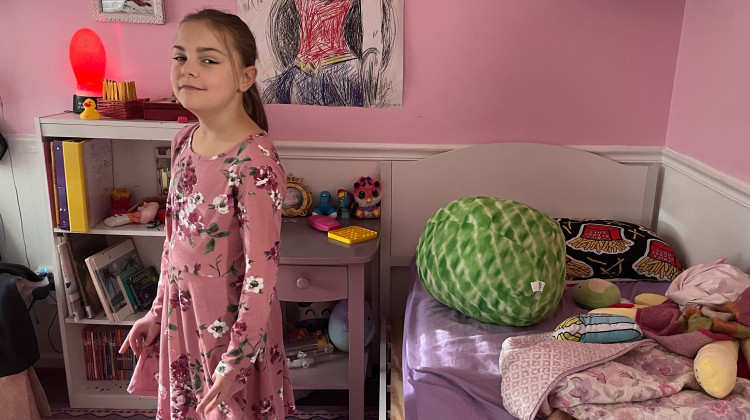
Lena, a fourth grader with multiple chronic health conditions, stands in the bedroom of her northwestern Indiana home on Tuesday, Sept. 26, 2023. Lena’s mom fought the local public school system after administrators said Lena couldn’t attend her neighborhood school and couldn’t bring a private nurse with her to school.
Dylan Peers McCoy / WFYIWhen Lena started kindergarten, she needed a nurse by her side. Lena was born prematurely — she weighed only about a pound and spent more than four months in a neonatal intensive care unit.
Lena lives with multiple chronic health conditions, including a serious form of asthma, a blood clotting disorder and congenital kidney conditions.
For those reasons, Lena has — for most of her life — required a nurse by her side about 60 hours per week to monitor her condition and administer medical aid.
Victoria Schwarten, Lena’s mother, tried to enroll her daughter in kindergarten at their Valparaiso neighborhood school in 2019 — the same one her older siblings attended.
But administrators with the local special education system told Schwarten that Lena couldn’t attend her neighborhood school. And she couldn’t bring a nurse with her to school. The nurse is paid for by their family’s insurance.
Instead, school staff told Schwarten that Lena would have to attend a segregated school for students with disabilities – still without her nurse.
Schwarten knew it wouldn’t be a safe environment for her daughter.
“I was worried about her choking and no one noticing it. I was worried about her having an asthma attack and having it progress to the point of needing intubation again — or worse,” Schwarten said.
The public school system’s plan for Lena was just too dangerous, she said. Schwarten ultimately enrolled her daughter in a private Montessori school that allowed Lena’s nurse in. Schwarten worked a second job to afford the tuition.
“I didn't know there were rights, or other things, that I could be doing to probe or push or investigate,” she said of the school system’s decision. “No clue. I just thought well, I guess [public school] is not an option.”
After Lena began attending the private school, Schwarten learned the district's plan for Lena violated her daughter’s right to a free, appropriate public education. She realized the public school system might be required to pay for Lena’s tuition because they wouldn’t accommodate her medical needs.
Schwarten and her daughter live in Porter County, a northwestern Indiana community where the special education system has faced intense criticism from parents. WFYI spent months investigating that system and spoke with more than two dozen parents, educators and advocates. Those interviews uncovered the challenges students and families face in the Porter County public education system — including conflicts with school staff over special education services and safety concerns due to dire staffing shortages.
The reporting also revealed the lengths that parents will go to get an education for their children.
While federal law mandates public schools provide an appropriate education to students with disabilities, it’s often up to parents to enforce it.
Schwarten did what few people have the resources to do: she hired a lawyer and requested a due process hearing. It’s like a court case. And it’s intended to resolve disputes between families and schools over special education services.
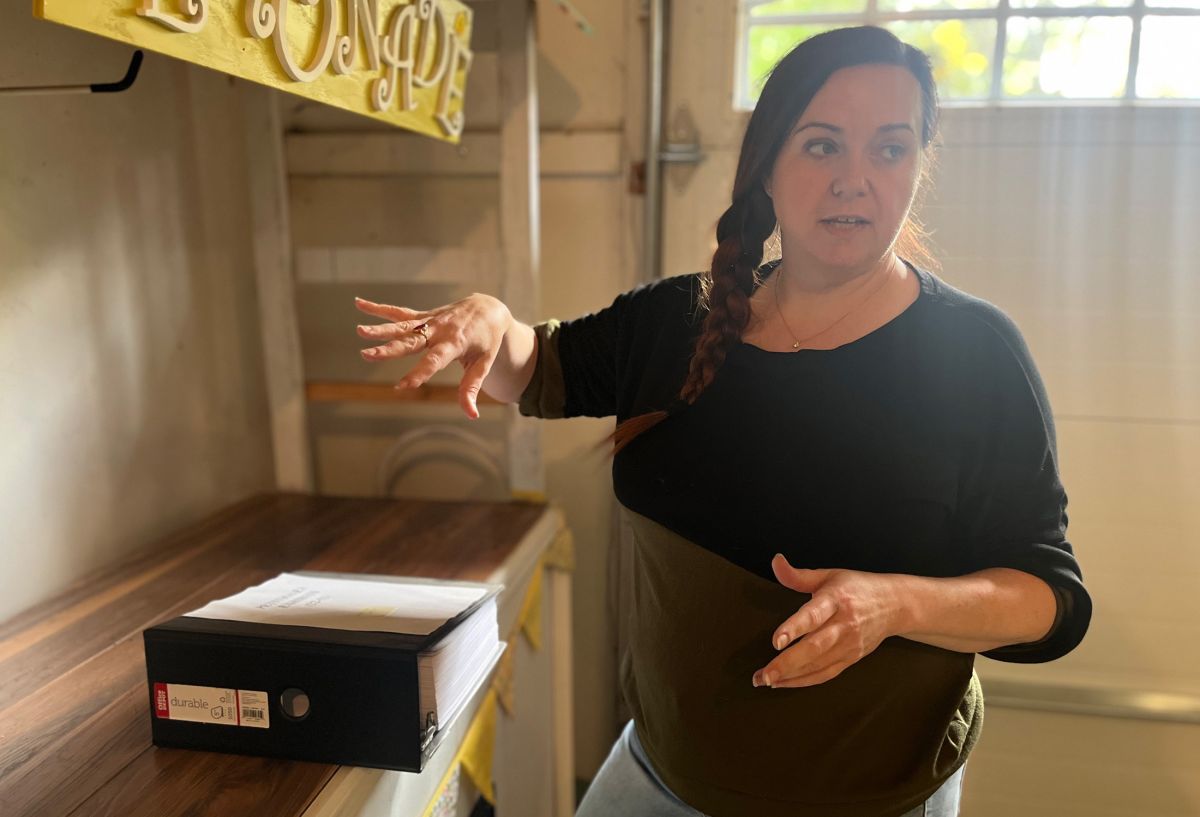
It’s also a traumatic and adversarial process for families and schools that can rack up hundreds of thousands of dollars in legal fees and destroy relationships between parents and district employees. And even when families win, children don’t always get the public education they deserve.
Schwarten won her due process case in August 2021. The hearing officer ordered the school system to pay Schwarten $22,000 to cover the cost of Lena’s education for the prior two years. But the decision didn’t require the public school to allow a nurse to be in the classroom with Lena. And Schwarten’s trust in the local public school system is now broken.
Sandy Bodnar, executive director of Porter County Education Services — the agency that provides special education services to all seven public school districts in the county — declined to answer questions about Schwarten’s case, stating that she is barred from talking about individual students.
“The law has its distinct limits,” said Perry Zirkel, a professor emeritus at Lehigh University who studies special education law. He said none of the federal legal remedies available to parents “really comes up with the kind of happy ending that we would like.”
During a due process hearing, both sides — the family and the school system — have an opportunity to present their case and back up their claims with evidence and witness testimony. An independent hearing officer oversees the proceeding and makes a decision. Families often hire attorneys, and Zirkel’s research indicates that if they don’t have lawyers, they’re significantly less likely to win.
“It becomes investing a huge amount of educational resources and time on law rather than on kids,” said Zirkel.
Between school years 2016-17 and 2020-21, there were about 90 requests for due process each year in Indiana. Most of those requests were either withdrawn or settled without a hearing.
Schools and families are motivated to settle these cases because due process hearings are time-intensive, expensive and emotionally draining procedures. And the contents of those settlements are often hidden from public view under non-disclosure agreements.
Nationally, requests for due process increased between 2011 and 2021— the latest year in which data is publicly available — according to the Center for Appropriate Dispute Resolution in Special Education, a federally funded agency that provides support and technical assistance to state agencies.
A high price for families
Schwarten was determined to fight for her daughter’s right to a public education, but she was unprepared for what came next.
“I didn't realize the depths of hell and all of the things that go with asking these questions and asking for accountability. And just to correct it. I didn't realize the gate that was opening and the flood that was to come from all of it,” Schwarten said.
There are very few attorneys in Indiana that represent parents in these cases, but Schwarten found a firm willing to take her case. She was told her legal fees would likely be in the six figures if she were to move forward with a due process proceeding.
Families also have to foot the bill for witness testimony. For example, if they need a medical professional like a psychologist to testify during a due process hearing, they usually need to pay that person for their time.
And families can only get their attorneys fees reimbursed by the school district if they win their due process hearing. It’s a lot of money to spend with little certainty that a family will prevail.
If Schwarten lost her case, she would be required to pay those fees herself.
“I was like, I guess I could file bankruptcy if I have to,” Schwarten said. “I don't know, I had to do something.”
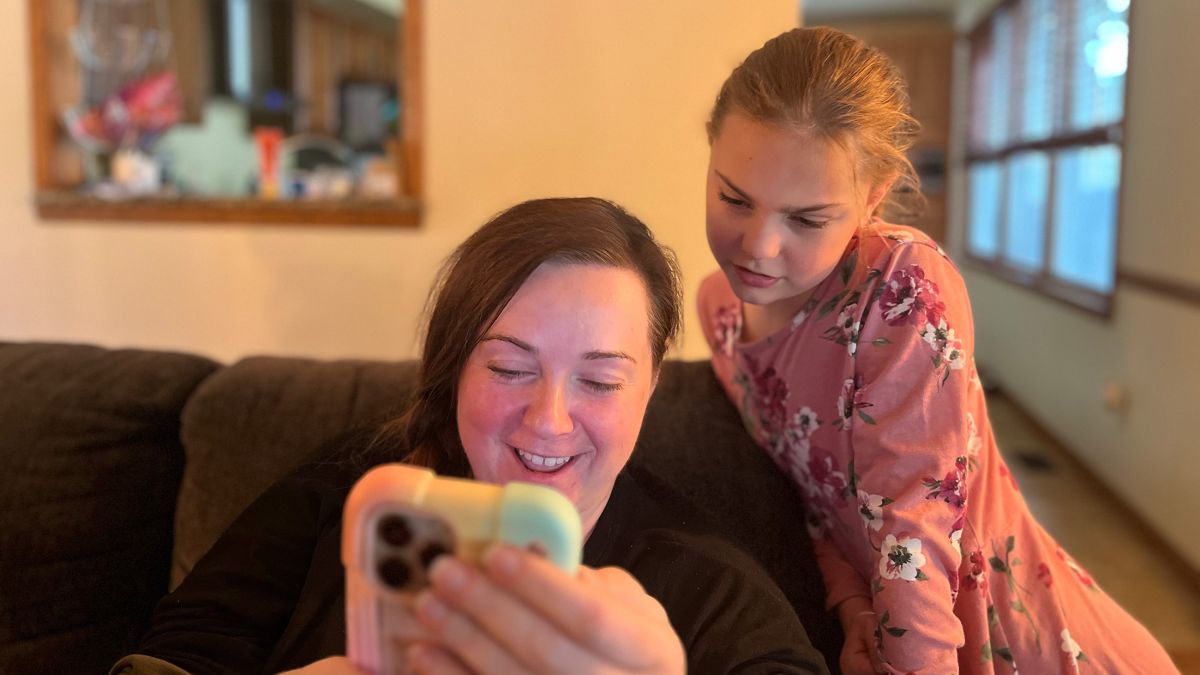
The school system appealed the hearing officer’s decision. And Schwarten settled the case out of federal court. She’s under a nondisclosure agreement that bars her from discussing the contents of the settlement, including whether and how much Porter County Education Services paid for her legal expenses.
WFYI requested the settlement agreement from the school system. Lawyers for Porter County Education Services released the document after this story was published.
The school system agreed to pay Schwarten $100,000 to cover the cost of her legal expenses, and $32,500 for Lena's educational expenses, according to the settlement agreement.
Not all families have the resources to invest in a due process case.
A 2019 report from the Government Accountability Office — a non-partisan Congressional watchdog agency — found that a greater proportion of school districts that serve affluent communities had due process complaints compared to districts that serve lower-income families.
Phyllis Wolfram is a retired special education administrator who worked in Missouri public schools. She said due process is a time and money-intensive process for schools as well as families.
“There are either many after-hours requirements of teachers and staff that become involved or the hiring of substitutes to pull those teachers out of classes to do preparation for it,” said Wolfram, now the executive director of the Council of Administrators of Special Education — a national organization that represents the interests of special education administrators.
Districts are also on the hook to pay for their own attorneys fees, as well as the cost of a family’s legal counsel if it’s ordered by a court or part of a settlement agreement.
For example, in 2016, a federal court ordered the School District of Philadelphia to pay more than $140,000 to cover the legal fees for a parent that had filed due process against the district and won.
A decade ago, the School Superintendents Association published a report that advocated for reforming the due process system. They wrote that the current procedures cost school districts so much, in both money and time, that it impedes their ability to serve all students with disabilities.
Porter County Education Services did not respond to questions about how due process impacts school personnel and the delivery of services to students.
The emotional toll
However, schools enter due process hearings with significant advantages.
“The law itself is skewed towards districts,” Zirkel said.
Schools often have a team of attorneys to represent them, and they can compel teachers, administrators and other school personnel to testify.
In most states, including Indiana, whoever files for due process — most often a parent or guardian — needs to convince a hearing officer that the district violated their child’s right to a public education.
According to Zirkel’s research, families in most states win these cases only about one-third of the time.
A big reason families often lose is because the law doesn’t really entitle students to that much, Zirkel said.
“The standard is not the best, it is not the optimum. It's reasonable,” he said. “And reasonableness is certainly significantly less than optimal or best.”
Last year, an Indiana state lawmaker attempted to shift the burden of proof from parents to schools in certain due process situations, but the legislation was rejected by the entire Senate.
Despite being at a disadvantage, parents across the country continue to use the process to try to get their children the services they believe they’re entitled to under the law.
In addition to the financial costs for both schools and families, due process can also harm relationships, according to Melanie Reese, the director for the Center for Appropriate Dispute Resolution in Special Education
“It can create hard feelings,” she said. “It can take an emotional toll on educators and families to go through due process.”
Schwarten described an invasive process that required her to hand over records of personal exchanges with friends and family members that reference her daughter’s school system. She said she testified for hours during the hearing. The process was so adversarial that she decided to pull Lena’s siblings out of public school because she feared retaliation from the district. She used Indiana’s voucher program to enroll them in private school.
“[Due process] affected everything. Work, home life. You couldn't really like – sit here and relax. I had too many things I had to [do to], like, prepare for our due process,” she said. “It was really just taxing — super traumatic and taxing,” Schwarten said.
Meghan Burke, a special education professor at Vanderbilt University, has researched the effect of due process on maternal stress levels. She found that mothers who go through these proceedings experience clinically significant high levels of stress.
Burke said a lot of families she’s spoken to say they move to another school system during or after a due process proceeding.
“Because, at that point, your relationship with the school system is so fragmented, it's probably unsalvageable,” Burke said.
While moving might feel like the only option for a family, it doesn’t incentivize a school system to change, Burke said.
Porter County Education Services did not respond to a question about how due process affects relationships between school staff and families.
The state complaint process
State complaints are another option for parents to try to hold schools accountable.
The complaint process is something many parents in Porter County — where Schwarten and her daughter live — have tried. In fact, over the past eight years, Porter County Education Services has been the subject of 99 state complaints. That’s more than any other school system, and over three times the average rate for the state. In most cases, the complaints were either withdrawn or investigators said the district didn’t do anything wrong. But in 31 cases, the state found a violation — more than double the number in any other district or special education cooperative.
Bodnar, the executive director of Porter County Education Services, said her agency examines their processes when complaints are filed to determine whether staff need more training. She said they also listen to parents.
“I can't control what their feelings are, or their frustrations. But I do think that we work very, very closely with those parents,” Bodnar said during a July 2022 interview.
The complaint process is overseen by each state’s department of education, which assigns an investigator to determine whether a violation of law has occurred and what should be done to correct it. Attorneys aren’t required to file a complaint.
It’s a faster timeline than a due process proceeding, which typically takes several months or years to resolve.
A less adversarial alternative
Due process doesn’t just damage relationships — it might be the consequence of bad relationships. Burke’s research suggests higher levels of parent advocacy — like filing for due process — within a school system may be a reaction to poor relationships with school staff.
WFYI interviewed other parents of students at Porter County Education Services who described meetings with staff that made them feel like they didn’t have a voice in their child’s education plan.
Bodnar, in the same interview last year, said only a small percentage of families they serve are dissatisfied.
“You're always going to have parents that are not going to be pleased with those services,” she said.
Reese, the director of the Center for Appropriate Dispute Resolution in Special Education, said sometimes due process may be the most appropriate way to address a dispute. But she’s hopeful it can be avoided if parents and educators believe that everyone is working toward the best interest of the student, and they actually listen to each other.

Reese wants to see additional emphasis on communication and conflict resolution training in teacher preparation programs, and more training for parents on how to successfully advocate for their children and understand their rights under the law.
“We really believe it is about relationships,” Reese said. “And the research backs us up that relationship development between parents and schools leads to better outcomes for children.”
That’s what Schwarten found at the Montessori school where Lena is a student. She said they easily accommodated Lena’s medical needs. In addition to letting her bring in her nurse, the school also allows Lena to take time off for doctors appointments.
Lena is now a fourth grader. Her favorite subject is art, and she’s obsessed with french fries. She has friends. And Schwarten said her daughter has made significant academic progress in that environment.
“I'm allowed to be her parent in that setting,” she said. “I don't have to sit there and compete with somebody else on what her best interests are.”
UPDATE (Nov. 3, 2023): This story has been updated to include details from Victoria Schwarten's settlement with the local school system, which the school system released after publication.
Dylan Peers McCoy co-reported this story.
Eric Weddle edited this story for broadcast and digital.
 DONATE
DONATE


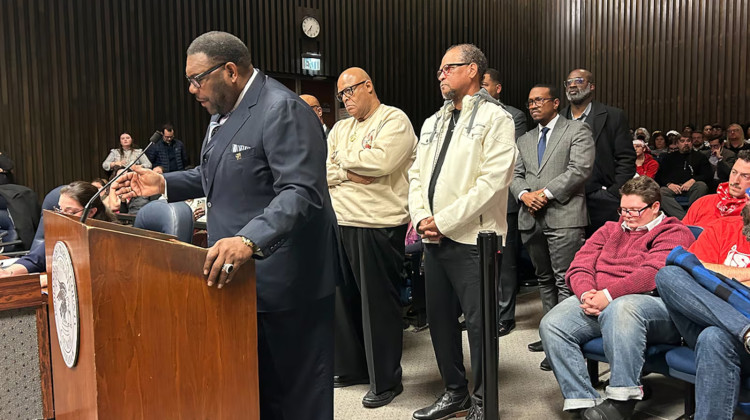
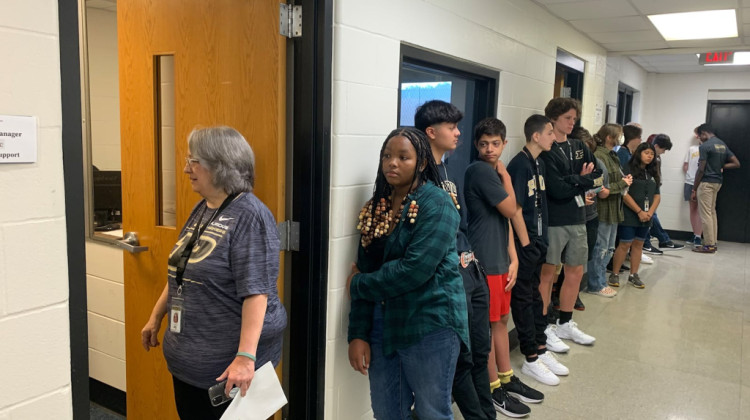
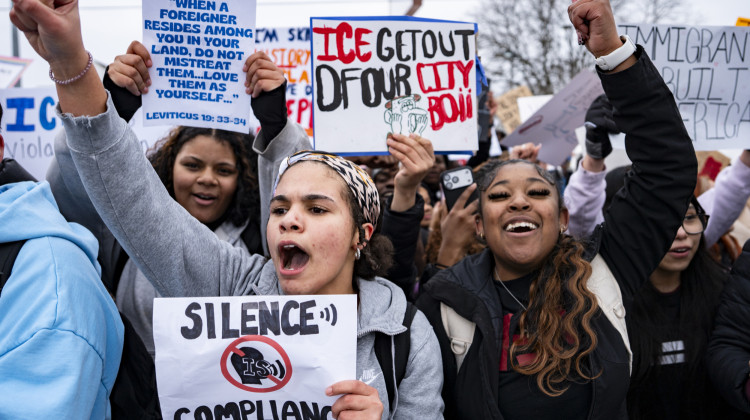

 Support WFYI. We can't do it without you.
Support WFYI. We can't do it without you.